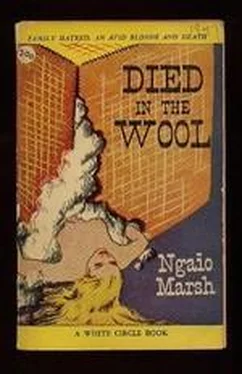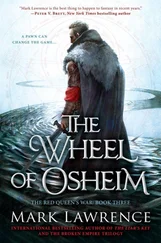Ngaio Marsh - Died in the Wool
Здесь есть возможность читать онлайн «Ngaio Marsh - Died in the Wool» — ознакомительный отрывок электронной книги совершенно бесплатно, а после прочтения отрывка купить полную версию. В некоторых случаях можно слушать аудио, скачать через торрент в формате fb2 и присутствует краткое содержание. Жанр: Классический детектив, на английском языке. Описание произведения, (предисловие) а так же отзывы посетителей доступны на портале библиотеки ЛибКат.
- Название:Died in the Wool
- Автор:
- Жанр:
- Год:неизвестен
- ISBN:нет данных
- Рейтинг книги:4 / 5. Голосов: 1
-
Избранное:Добавить в избранное
- Отзывы:
-
Ваша оценка:
- 80
- 1
- 2
- 3
- 4
- 5
Died in the Wool: краткое содержание, описание и аннотация
Предлагаем к чтению аннотацию, описание, краткое содержание или предисловие (зависит от того, что написал сам автор книги «Died in the Wool»). Если вы не нашли необходимую информацию о книге — напишите в комментариях, мы постараемся отыскать её.
Died in the Wool — читать онлайн ознакомительный отрывок
Ниже представлен текст книги, разбитый по страницам. Система сохранения места последней прочитанной страницы, позволяет с удобством читать онлайн бесплатно книгу «Died in the Wool», без необходимости каждый раз заново искать на чём Вы остановились. Поставьте закладку, и сможете в любой момент перейти на страницу, на которой закончили чтение.
Интервал:
Закладка:
“But it was you who organized this strip-tease act, Fabian,” Ursula pointed out. “The rest of us have had to do our stuff. Why should Terry get off?”
She looked at Terence and frowned. She was a lovely creature, Alleyn thought. Her hair shone in copper tendrils along the nape of her neck. Her eyes were wide and lively, her mouth vivid. She had something of the quality of a Victorian portrait in crayons, a resemblance that was heightened by the extreme delicacy and freshness of her complexion and by the slender grace of her long neck and her elegant hands. She displayed, too, something of the waywardness and conscious poise of such a type. These qualities lent her a dignity that was at variance with her modern habit of speech. She looked, Alleyn thought, as though she knew she would inevitably command attention and that much would be forgiven her. She was obstinate he thought, but he doubted if obstinacy alone was responsible for her persistent defence of Florence Rubrick. He had been watching her closely and, as though she felt his gaze upon her and even caught the tenor of his thoughts, she threw him a brilliant glance and ran impulsively to Terence.
“Terry,” she said, “am I unfair? I don’t want to be unfair but there’s no one else but me to speak for her.”
Without looking at him she held out her hand to Fabian and immediately he was beside her, holding it.
“You’re not allowed to snub me, Fabian, or talk over my head or go intellectual at me. I loved her. She was my friend. I can’t stand off and look at her and analyze her faults. And when all of you do this, I have to fight for her.”
“I know,” said Fabian, holding her by the hand. “It’s all right. I know.”
“But I don’t want to fight with Terry. Terry, I don’t want to fight with you, do you hear? I’d rather after all that you didn’t tell us. I’d rather go on liking you.”
“You won’t get me to believe,” said Douglas, “that Terry’s done anything wrong and I tell you straight, Fabian, that I don’t much like the way you’re handling this. If you’re suggesting that Terry’s got anything to be ashamed about…”
“Be quiet!”
Terence was on her feet. She had spoken violently as if prompted by some intolerable sense of irritation. “You’re talking like a fool, Douglas. ‘Ashamed’ or ‘not ashamed,’ what has that got to do with it? I don’t want your companionship and, Ursula, I promise you I don’t give a damn whether you think you’re being fair or unfair or whether, as you put it, you’re prepared to ‘go on liking me.’ You make too many assumptions. To have dragooned me into going so far and then to talk magnanimously about letting me off! You’ve all made up your minds, haven’t you, that I loved him. Very well, then, it’s perfectly true. If Mr. Alleyn is to hear the whole story, at least let me tell it, plainly and, if it’s not too fantastic a notion, with a little dignity.”
It was strange, Alleyn thought, that Terence Lynne, who from the beginning had resented the discussion and all that it implied, should suddenly yield, as the others had yielded, to this intolerable urge for self-revelation. As she developed her story, speaking steadily and with a kind of ruthlessness, he regretted more and more that he could form no clear picture in his mind of Florence Rubrick’s husband — of how he looked, of how wide a physical disparity there had been between Arthur Rubrick and this girl who must have been twenty years his junior.
Terence had been five years in New Zealand. Equipped with a knowledge of shorthand and typing and six letters of recommendation, including one from the High Commissioner in London to Flossie herself, she had sought her fortune in the Antipodes. Flossie immediately engaged her, and she settled down to life at Mount Moon interspersed with frequent visits to Flossie’s pied-à-terre near Parliament Buildings in Wellington. She must, Alleyn thought, have been lonely in her quiet, contained way; separated by half the world from her own country, her lot fallen among strangers. Fabian and Ursula, he supposed, had already formed an alliance in the ship, Douglas Grace had not yet returned from the Middle East, and she had obviously felt little respect or liking for her employer. Yes, she must have been lonely. And then Flossie began to send her on errands to her husband. “Those statistics on revaluation, Miss Lynne, I want something I can quote. Something comparative. You might just go over the notes with my husband. Nothing elaborate, tell him. Something that will score a point.” And Arthur Rubrick and Terence Lynne would work together in the study. She found she could lighten his task by fetching books from the shelves and by taking notes at his dictation. Alleyn formed a picture of this exquisitely neat girl moving quietly about the room or sitting at the desk while the figure in the armchair dictated, a little breathlessly, the verbal bullets that Flossie was to fire at her political opponents. As they grew to know each other well, she found that, with a pointer or two from Arthur Rubrick, she was able to build up most of the statistical ammunition required by her employer. She had a respect for the right phrase and for the just fall of good words, each in its true place, and so, she found, had he. They had a little sober fun together, concocting paragraphs for Flossie, but they never heard themselves quoted. “She used to peck over the notes like a magpie,” Terence said, “and then rehash them with lots of repetition so that she would be provided with opportunities to thump with her right fist on the palm of her left hand. ‘In 1938,’ she would shout, beating time with her fist, ‘in 1938, mark you, in 1938 the revenue from such properties amounted to three and a quarter million. To three and a quarter million. Three and a quarter million pounds, Mr. Speaker, was the sum realized…’ And she was quite right. It went down much better than our austerely balanced phrases would have done if ever she’d been fool enough to use them. They only appeared when she handed in notes of her speeches for publication. She kept them specially for that purpose. They looked well in print.” It had been through this turning of phrases that Flossie’s husband and her secretary came to understand each other more thoroughly. Flossie was asked by a weekly journal to contribute an article on the theme of women workers in the back-country. She was flattered, said Terence, but a bit uneasy. She came into the study and talked a good deal about the beauty of women’s work in the home. She said she thought the cocky-farmer’s wife led a supremely beautiful existence because it was devoted to the basic fundamentals (she occasionally coined such phrases) of life. “A noble life,” Flossie said, ringing for Markins, “they also serve—” But the quotation faltered before the picture of any cocky-farmer’s wife whose working-day is fourteen hours long and comparable only to that of a man under a sentence of hard labour. “Look up something appropriate, Miss Lynne. Arthur darling, you’ll help her. I want to stress the sanctity of women’s work in the high country. Unaided, alone. You might say matriarchal,” she threw at them as Markins came in with the cup of patent food she took at eleven o’clock. Flossie sipped it and walked up and down the room throwing out unrelated words: “True sphere… splendour… heritage… fitting mate.” She was called to the telephone but found time to pause in the door and say: “Away you go, both of you. Quotations, remember, but not too highbrow, Arthur darling. Something sweet and natural and telling.” She waved her hand and was gone.
The article they wrote was frankly heretical. They had stood side by side in the window and looked over the plateau to the ranges, now a clean thin blue in the mid-morning sunshine.
Читать дальшеИнтервал:
Закладка:
Похожие книги на «Died in the Wool»
Представляем Вашему вниманию похожие книги на «Died in the Wool» списком для выбора. Мы отобрали схожую по названию и смыслу литературу в надежде предоставить читателям больше вариантов отыскать новые, интересные, ещё непрочитанные произведения.
Обсуждение, отзывы о книге «Died in the Wool» и просто собственные мнения читателей. Оставьте ваши комментарии, напишите, что Вы думаете о произведении, его смысле или главных героях. Укажите что конкретно понравилось, а что нет, и почему Вы так считаете.










